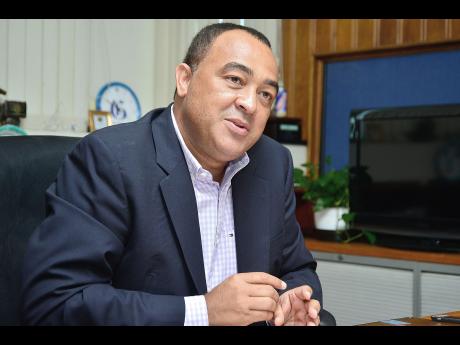Christopher Tufton | Tobacco lobby all smoke and mirrors
I am deeply concerned by recent news headlines that paint a picture of a relentless tobacco industry keen on advancing its own interests at the expense of public health.
From the call for a reduction in the special consumption tax (SCT) on cigarettes to reports of falling profits, there is a clear need to remind the public of the enormous public-health risk posed by tobacco use and exposure, whether through legal or illegal tobacco products.
From cancer and heart disease to high blood pressure, stroke, asthma, and diabetes, Jamaica's non-communicable disease (NCD) burden is made heavier by smoking and is both painful and costly.
There are those among us who are acquainted with the horrific toll that cancer, for example, takes on the body and the enormous strain it is on the pocket - many times with a fatal outcome for the person with the disease, and trauma for their loved ones left behind.
According to the World Health Organization (WHO), 40 million people died from NCDs in 2015, equivalent to 70 per cent of deaths globally. A similar situation was observed in Jamaica with STATIN reporting that in 2015, seventy per cent of deaths in the population five years and older died from NCDs.
It doesn't end there.
DISEASE BURDEN
Smoking is also linked to communicable diseases, such as tuberculosis and lower-respiratory infections. In addition, it causes dental disease and reproductive health problems, resulting in premature births and low birthweight babies in women who smoke during pregnancy. It is known, too, to increase the risk of sudden infant death.
Yet, the tobacco industry would have us acquiesce to its call for a reduction in the SCT on cigarettes, suggesting that to do so would be to stymie the illicit trade in tobacco.
However, to reduce the SCT would be to encourage greater consumption of tobacco, providing, as it would, cheaper access to the products, something that the Ministry of Health could not countenance.
Indeed, to support such a reduction would be tantamount to operating against the public-health interest, particularly since price and tax measures have been shown to be a tool for reducing tobacco consumption and, in particular, among youth.
CONTRARY TO OBLIGATIONS
Such a move would also run contrary to our obligations under the WHO Framework Convention on Tobacco Control (FCTC), to which Jamaica became signatory in 2003 and later ratified in 2005.
That convention obligates us to "protect present and future generations from the devastating health, social, environmental, and economic consequences of tobacco consumption and exposure to tobacco smoke by providing a framework for tobacco-control measures ... to reduce continually and substantially the prevalence of tobacco use and exposure to tobacco smoke".
The convention itself also encourages price and tax measures to reduce the demand for tobacco. The evidence that this measure works is seen right here in Jamaica where "aggregate recorded cigarette consumption decreased by 36.3% between 2004-05 and 2012-13".
According to the 2015 report, 'A Review of Excise Taxes on Cigarettes in Jamaica', written by Professor Corne van Walbeek for the Ministry of Health, one of the factors credited with that decrease was that "the real price of cigarettes increased by 35 per cent over this period".
THE ILLICIT TRADE
Much has been made over the last few weeks of the illicit trade in tobacco, with the apparent goal to agitate the public. However, statistics that reveal an increase in the numbers of illegal tobacco products seized is not necessarily an indication of a burgeoning illicit trade, but rather, evidence of more effective control and enforcement by our Customs and border-control personnel.
The efforts of these professionals should, in fact, be applauded and not used as fodder to fire the imagination of the public, in an attempt to obscure their view of the truth, which is that, whether legal or illegal, the trade in tobacco is a scourge on public health.
Still, Jamaica is doing its part to curtail the illicit trade. The island is, for example, taking steps to ratify the Protocol to Eliminate Illicit Trade in Tobacco Products. The illicit trade in tobacco products, in the context of the protocol, means "any practice or conduct related to producing, shipping, receiving, being in possession of, distributing, selling or buying tobacco products and that is prohibited by law".
Ratification of the protocol will mean that Jamaica is better positioned to tackle the illicit trade in tobacco products in general, including cigarettes.
The Ministry of Health also conducts training with the Jamaica Customs Agency to help them to identify and track illicit tobacco products at the ports and has had some dialogue with the Jamaica Constabulary Force and the Bureau of Standards which, through their standards officers, are named authorised officers under the Public Health (Tobacco Control) Regulations.
DOUBLING DOWN
Whatever the travails of the tobacco trade, it is time for those of us among whom public health takes primacy to redouble our efforts to bring about a reduction in tobacco consumption and exposure to tobacco smoke.
Jamaica has, over the last five years, made steady progress towards achieving this end, in the public-health interest. Those steps include the introduction of the 2013 Public Health (Tobacco Control) Regulations, which, among other things, prohibits smoking in public places.
Jamaica is also now focused on the implementation of comprehensive tobacco-control legislation with a view to bringing the island into full compliance with its obligations under the WHO FCTC.
Any action that gives even the appearance of stepping back from those obligations is ill-advised, because it is the health of the people of Jamaica that is at stake.
- Dr Christopher Tufton is the minister of health. Email feedback to columns@gleanerjm.com.


